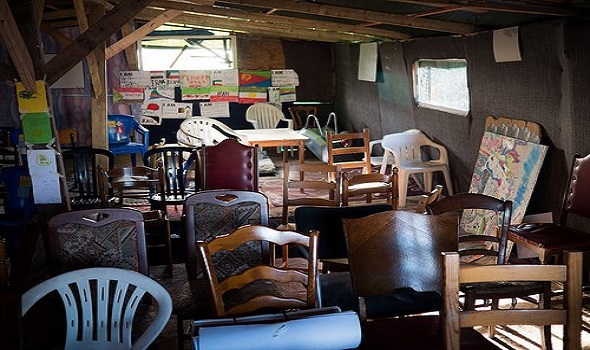Exhibitions fit for a migrant nation
Exhibitions fit for a migrant nation

The Migration Museum continues its slow but hopefully inexorable advance towards becoming a permanent institution.
It finally has a home, though only until February 2018, in a vast unwelcoming space that's awaiting development in Lambeth, south London.
Glance at the fire engine as you enter (the showpiece of another nascent museum, for the London fire brigade), ignore the Zen room, a room filled with scores of rhubarb- and pear-flavoured drink cartons and the Institute of Imagination, and hope that the friendly museum staff have by now sorted out the almost invisible signs that caused early visitors to wander, confused, around the long, high cavern.
You will finally identify the right door, and be confronted by a notice informing you that "ever since the first Jute, the first Saxon, the first Roman and the first Dane leaped off their boats and planted their feet on British mud, we have been a migrant nation." You know you have arrived.
Further confirmation comes up the steps when you confront a large image of Yasser: brought up in Sudan, imprisoned and tortured, he fled through Libya to Britain, where he was given asylum in 2005 - though the caption tells us that he is still scared to call on authorities such as the police or ambulance in case he is sent back.
Inside the new museum space are two excellent exhibitions: Call Me By My Name, originally staged elsewhere last year before the demolition of "the Jungle" camp at Calais, and Images of Migration, a sample of large photographs of people who migrated to the UK for a variety of reasons that are explained in the accompanying captions.
Though neither exhibition is new, both are worth another look. The Calais camp and the memorabilia assembled here - including paintings, fake lifejackets (probably responsible for many deaths at sea), photographs, models, testimonies. Few of the 365,000 migrants and refugees who reached Europe last year (down from more than 1m in 2015) reached Calais, but its horrible conditions are a symbol of Europe’s failure to organise a proper response to those fleeing injustice and hardship.
The cost of that failure, to us, the host countries, as well as to the new arrivals, is hinted at in one of the moving testimonies in the exhibition: "A volunteer from the UK was trying to build a shelter with very minimal materials, and a refugee had been watching him for two days, silently from afar, respectfully. After two days he came up and he said, "Please don't be offended, and I hope you don't mind, but can I help you? Because I'm a structural engineer in Syria and I built skyscrapers and I know that I can help you build this shelter better."
Similarly, the photos in the Images display illustrate the diversity of the people who have made their way here and the range of their motives and experiences: "My family's uprooting and exile to Papua New Guinea paradoxically catches me in reverse," remembers Rodney Yates, photographed as a boy on the deck of a ship. "Ostensibly a 'native' of PNG having been born there, my uprooting was at age eight, when along with my brother Ed, we were 'repatriated' to a life we had never known, so my formative years were broken up into one of estrangement, disorientation and homesickness for an idyllic childhood which had come to an end with being launched in the Spartan setting of a South London boarding school, where I was based for next 10 years. Culture shock was my abiding memory of the latter part of that childhood and I have always put some distance between myself and 'British natives'....
* Call Me by My Name: Stories from Calais and Beyond + Images of Migration are on display at the Migration Museum at the Workshop, 26 Lambeth High Street, SE1, until 30 July, Weds–Sun, 10am–4pm, free
+ 21 May, Spicy eggs and Jungle chai, a day to remember Calais, music, jamming, art projects, food and a performance of the satirical comedy Borderline, free except for the play, which is £10, noon-6.30pm
+ In late May 2017 another exhibition will open: Keepsakes, a display of personal items that keep memories of migration and identity alive


